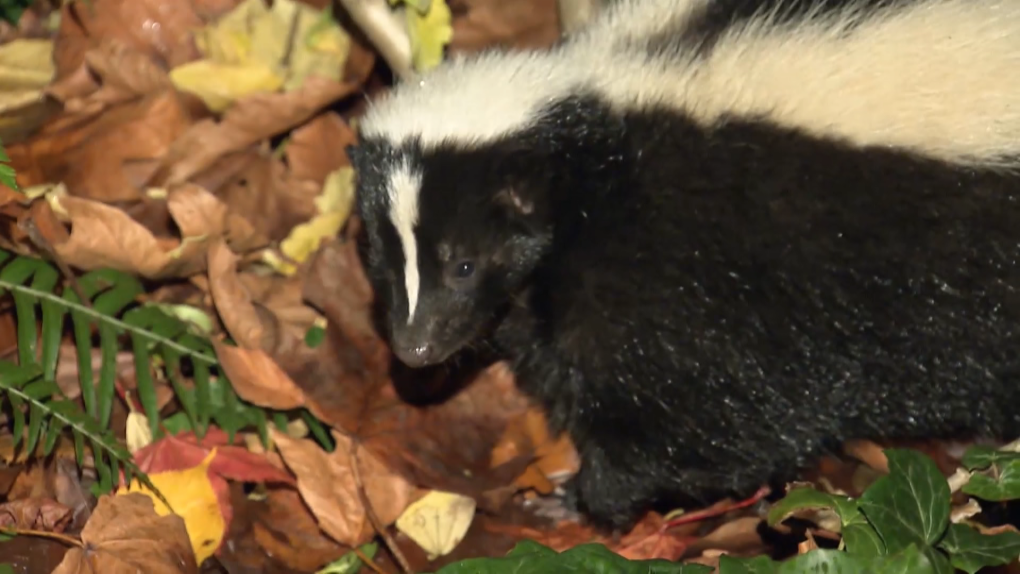Skunk removal remains in Cold Lake budget for second year in a row

Popular last year, a taxpayer-funded program to remove skunks from the city of Cold Lake has been renewed for a second year.
As Cold Lake is located in the boreal forest, skunks are among the wildlife that residents frequently see pass through.
In 2023, the northern Alberta city paid a professional to set 33 traps and remove the 14 skunks that were caught.
“Not everybody wants to deal with a skunk… So it’s been well received by the community and something that was getting asked by the residents,” mayor Craig Copeland explained to CTV News Edmonton in an interview on Wednesday.
The city has again budgeted $6,000 for the service this year.
The trapper is paid each time he sets a trap; more if he catches and needs to remove a skunk and less if no animal is caught over five days.
Previously, residents needed to pay for removals.
While a skunk’s stinky spray is foul, it is not harmful to humans.
Cold Lake is most concerned about the skunk population growing.
“I’ve had skunks in my backyard, but none that have made my house their home. And really, that’s the issue is that skunks in Cold Lake will travel through the community,” Copeland said.
“It’s when they decide – whether it’s underneath your deck or underneath your shed – that they’re going to make home and then make babies and all that, and if you have a dog or a cat, then all of a sudden they interface with the skunks.”
The executive director of WILDNorth, a rescue and rehabilitation agency, applauded Cold Lake for taking action to try to mitigate human-wildlife conflicts.
“When we live particularly in areas like Edmonton where we have the largest green space of any North American city, places like Cold Lake where they’re surrounded by forested areas, we’re going to have to live in harmony with local wildlife. It’s just a fact,” Dale Gienow told CTV News Edmonton.
However, he encouraged the city, or any person or municipality dealing with a skunk issue, to contact a professional to determine what method is most appropriate for the situation.
“Studies have universally shown us that relocating skunks or translocating them to other areas in a roundabout way actually increases skunk populations in your city or municipality… Let’s say you have a mature male skunk and it’s moved from that territory, as many as five young male skunks might come to fill that territory,” he said.
Gienow pointed to Red Deer in central Alberta, which had a “significant” skunk problem in 2012, as an example.
At the height of the issue, as many as 100 were being euthanized in a year, according to Medicine River Wildlife Centre, which worked with Red Deer on the issue.
“Over nine years of studying there, they have realized that using softer approaches of skunk deterrents – making sure you have skunk friendly yards where there’s no garbage or food out, things like this – are actually better ways of reducing skunk populations than relocating them,” Gienow said.
Medicine River Wildlife Centre says litter sizes shrunk from eight to 10 babies to two to four and calls from residents have been reduced by 30 per cent. More than half of the calls that are made are about “non-resident” skunks – those that are simply wandering in the city looking for food.
Relocation also increases the risk of mortality in other species, so both Gienow and Medicine River Wildlife Centre operate on the same assumption with skunks.
Instead, they recommend residents attempt to make a skunk’s den “unsafe,” whether that’s by adding light during the daytime (skunks are nocturnal), noise, or a potential predator’s feces (such as a dog) to their space.
Gienow offered one other bit of advice: “We always think of the negatives with skunks being around: that spray. And so we’re afraid of them. But actually, skunks are very beneficial creatures. Skunks love to eat things like grouts… They also help control insect populations, namely things like bees and wasps and other things that are undesirable… They help control rodent populations. So if you have a mouse problem, you’d be happy to have a skunk around.”
Skunks are also a rabies vector species, but a case of rabies has not been recorded in a skunk in Alberta since 1994.
Heavy exposure to skunk spray can cause damage to a dog’s eyes.
More information is available on both WILDNorth and Medicine River Wildlife Centre’s websites.
With files from CTV News Edmonton’s Miriam Valdes-Carletti
View original article here Source









